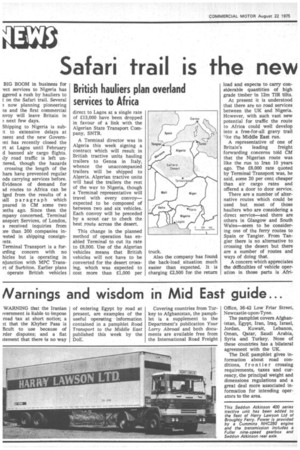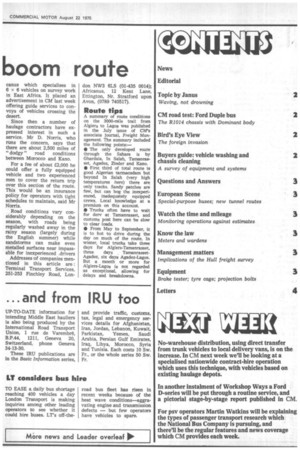Safari trail is the new boom route
Page 4

Page 5

If you've noticed an error in this article please click here to report it so we can fix it.
British hauliers plan overland services to Africa
BIG BOOM in business for vet services to Nigeria has ggered a rush by hauliers to t on the Safari trail. Several ?, now planning pioneering as and the first commercial nvoy will leave Britain in next few days.
Shipping to Nigeria is sub;t to extensive delays at ..sent and the new Governmt has recently closed the rt at Lagos until February d banned air cargo flights. Lly road traffic is left untered, though the hazards crossing the length of the hara have prevented regular ods carrying services before. Evidence of demand for ad routes to Africa can be lged from the results of a Lall paragraph which peared in CM some two )nths ago. Since then •the mpany concerned, Terminal ansport Services, of London, s received inquiries from re than 200 companies inested in shipping consign?nts.
Terminal Transport is a forirding concern with no hides but is operating in njunction with MPC Transrt of Surbiton. Earlier plans operate British vehicles direct to Lagos at a single rate of £13,000 have been dropped in favour of a link with the Algerian State Transport Company, SNTR.
A Terminal director was in Algeria this week signing a contract which will result in British tractive units hauling trailers to Genoa in Italy, whence the unaccompanied trailers will he shipped to Algeria. Algerian tractive units will haul the trailers the rest of the way to Nigeria, though a Terminal representative will travel with every convoy— expected to be composed of between two and six vehicles. Each convoy will be preceded by a scout car to check the best route across the desert.
This change in the planned method of operation has enabled Terminal to cut its rate to £8,000. Use of the Algerian vehicles means that British vehicles will not have to be converted for the desert crossing, which was expected to cost more than £1,000 per truck.
Also the company has found the back-load situation much easier than expected. It is charging £2,500 for the return load and expects to carry considerable quantities of high grade timber M 12m TIR tilts.
At present it is understood that there are no road services between the UK and Nigeria. However, with such vast new potential for traffic the route to Africa could well develop into a free-for-all gravy trail 'ike the Middle East run.
A representative of one of Britain's leading freight forwarding concerns told CM that the Nigerian route was like the run to Iran 10 years ago. The £8,000 rate quoted by Terminal Transport was, he said, some 20 per cent cheaper than air cargo rates and offered a door to door service.
There are a number of alternative routes which could be used but most of those hauliers who are considering a direct service—and there are others in Glasgow and South Wales—seem to be considering one of the ferry routes to Spain or Tangier. From Tangier there is no alternative to crossing the desert but there are a number of routes and ways of doing that A concern which appreciates the diffictilties of vehicle operation in those parts is Afri canus which specialises in 6 > 6 vehicles on survey work in East Africa. It placed an advertisement in CM last week offering guide services to convoys of vehicles crossing the desert.
Since then a number of haulage contractors have expressed interest in such a service. Mr D. Norris, who runs the concern, says that there are about 2,500 miles of " dodgy " road conditions between Morocco and Kano.
For a fee of about £2,000 he could offer a fully equipped vehicle and two experienced men to cover the return trip over this section of the route. This would be an insurance policy for operators with tight schedules to maintain, said Mr Norris.
Road conditions vary considerably depending on the season, with roads 'being regularly washed away in the rainy season (largely during the English summer) while sandstorms can make even metalled surfaces near impassable for inexperienced .drivers Addresses of companies mentioned in this article are : Terminal Transport Services, 251-253 Finchley Road, Lon don NW3 6LS (01-435 0014); Africanus, 12 Kent Lane, Ettington, Nr. Stratford upon Avon, (0789 740517).
Route tips
A summary of route conditions on the 3000-mile trail from Algiers to Lagos was published in the July issue of CM's associate journal, Freight Management. The summary included the following points:—
• The only developed route through the Sahara is by Ghardaia, In SaIah, Tamanrasset, Agadez, Zinder and Kano.
• First third of total route is good Algerian tarmacadam but beyond In Salah (very high temperatures here) there are only tracks. Sandy patches are few, but can bog the inexperienced, inadequately equipped crews. Local knowledge at a premium on this account.
• Trucks often have to wait for dery at Tamanrasset, and customs post here can be slow to clear loads.
• From May to September, it is to hot to drive during the day on much of the route. In winter, local trucks take three days for Algiers-Tamanrasset,
three days TamanrassetAgadez, six days Agadez-Lagos.
But a month or more for Algiers-Lagos is not regarded as exceptional, allowing for delays and breakdowns.












































































